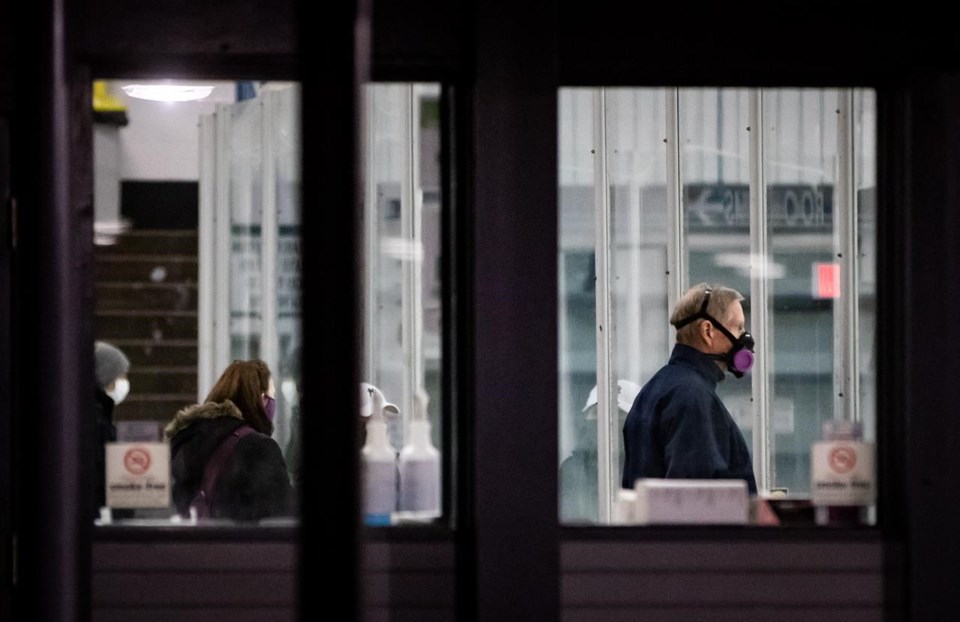VICTORIA — Health officials say the restrictions put in place in B.C.'s most populous health regions could be extended or modified depending on whether COVID-19 cases spike or dip.
Over the weekend, B.C.'s chief public health officer issued directives requiring people living in two health regions to cut back on their social interactions in order to slow the rising COVID-19 case count.
Dr. Bonnie Henry's latest directive on Saturday said that people in the Vancouver Coastal and Fraser health regions may only socialize with those in their "core bubble."
The provincial web page notes a person's core bubble consists of others who live in the same home and may also include a partner, co-parent, relative or friend who lives in a different household.
Gatherings with anyone other than members of the same core bubble are not allowed either indoors or outdoors, though the web page notes that going for a walk is not considered a social gathering.
B.C. has reported 998 new cases of COVID-19 detected over two days, pushing the number of active infections to 4,891. Five more people have died after contracting the illness for a death toll of 281.
Henry said health officials are monitoring where people are contracting COVID-19 and the two-week order could change depending on what they learn.
"Orders are a last resort, but they are what we need to put in place right now to address those areas where we were seeing transmission happening and expanding rapidly," she told a news conference on Monday.
"This latest action in our COVID-19 response is about putting the breaks on the virus — breaking those chains of transmission. It is a short-term pause on non-essential activities and travel to ensure that our essential activities like school and work and health care can continue."
Of the latest cases, Henry said 210 are in the Vancouver Coastal Health region, while 737 are in the Fraser Health region spanning Burnaby to Hope.
B.C. has reported 18,714 cases of COVID-19 since the start of the pandemic. There are 133 people in hospital with the illness.
Health Minister Adrian Dix said Monday there are 391 regular hospital beds vacant in B.C. with occupancy rates varying across health authorities and 1,894 vacant "surge" beds added during the pandemic.
Henry also said she's excited about positive news from a clinical trial for a potential COVID-19 vaccine involving about 44,000 people from countries where the illness has been surging.
She said she hasn't seen the actual data, but preliminary analysis released by pharmaceutical giant Pfizer suggests efficacy up to 90 per cent for the vaccine that could be available in the first quarter of next year.
That's a great result, she said, adding that protection of at least 50 or 60 per cent would make a major difference in curbing the spread of the illness.
"The vaccine's going to be in limited supply. We're not going to be able to give it to everybody at once. But we can give it to people who are more likely to have severe illness and protect them," she said.
"It's not going to be easy, but early in 2021 we should have vaccine to add to our tools to stop this pandemic."
The province also announced Monday that tenants in B.C. will be protected from rent increases until at least next summer.
In one of its first acts since being re-elected on Oct. 24, Premier John Horgan's New Democrat government extended the freeze on rent increases until July 10, 2021.
A statement from the Ministry of Municipal Affairs and Housing said the freeze is an interim measure to "provide stability and advance notice for renters and landlords while a new cabinet is sworn in."
The government first froze rents in mid-March for part of a relief plan as the COVID-19 pandemic hit.
Rent increases that were set for Dec. 1, 2020, have been cancelled and the province says tenants who may have received a notice of a pending rent hike should ignore it and continue paying their current rate.
This report by The Canadian Press was first published Nov. 9, 2020.
The Canadian Press




